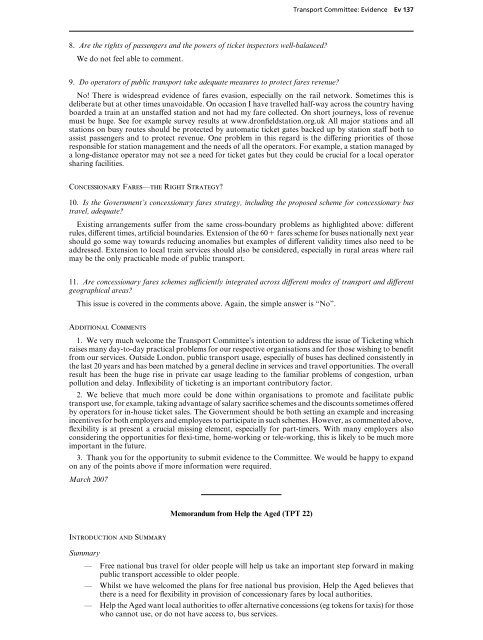Ticketing and Concessionary Travel on Public Transport - United ...
Ticketing and Concessionary Travel on Public Transport - United ...
Ticketing and Concessionary Travel on Public Transport - United ...
Create successful ePaper yourself
Turn your PDF publications into a flip-book with our unique Google optimized e-Paper software.
8. Are the rights of passengers <str<strong>on</strong>g>and</str<strong>on</strong>g> the powers of ticket inspectors well-balanced?<br />
We do not feel able to comment.<br />
9. Do operators of public transport take adequate measures to protect fares revenue?<br />
<strong>Transport</strong> Committee: Evidence Ev 137<br />
No! There is widespread evidence of fares evasi<strong>on</strong>, especially <strong>on</strong> the rail network. Sometimes this is<br />
deliberate but at other times unavoidable. On occasi<strong>on</strong> I have travelled half-way across the country having<br />
boarded a train at an unstaVed stati<strong>on</strong> <str<strong>on</strong>g>and</str<strong>on</strong>g> not had my fare collected. On short journeys, loss of revenue<br />
must be huge. See for example survey results at www.dr<strong>on</strong>fieldstati<strong>on</strong>.org.uk All major stati<strong>on</strong>s <str<strong>on</strong>g>and</str<strong>on</strong>g> all<br />
stati<strong>on</strong>s <strong>on</strong> busy routes should be protected by automatic ticket gates backed up by stati<strong>on</strong> staV both to<br />
assist passengers <str<strong>on</strong>g>and</str<strong>on</strong>g> to protect revenue. One problem in this regard is the diVering priorities of those<br />
resp<strong>on</strong>sible for stati<strong>on</strong> management <str<strong>on</strong>g>and</str<strong>on</strong>g> the needs of all the operators. For example, a stati<strong>on</strong> managed by<br />
a l<strong>on</strong>g-distance operator may not see a need for ticket gates but they could be crucial for a local operator<br />
sharing facilities.<br />
<str<strong>on</strong>g>C<strong>on</strong>cessi<strong>on</strong>ary</str<strong>on</strong>g> Fares—the Right Strategy?<br />
10. Is the Government’s c<strong>on</strong>cessi<strong>on</strong>ary fares strategy, including the proposed scheme for c<strong>on</strong>cessi<strong>on</strong>ary bus<br />
travel, adequate?<br />
Existing arrangements suVer from the same cross-boundary problems as highlighted above: diVerent<br />
rules, diVerent times, artificial boundaries. Extensi<strong>on</strong> of the 60! fares scheme for buses nati<strong>on</strong>ally next year<br />
should go some way towards reducing anomalies but examples of diVerent validity times also need to be<br />
addressed. Extensi<strong>on</strong> to local train services should also be c<strong>on</strong>sidered, especially in rural areas where rail<br />
may be the <strong>on</strong>ly practicable mode of public transport.<br />
11. Are c<strong>on</strong>cessi<strong>on</strong>ary fares schemes suYciently integrated across diVerent modes of transport <str<strong>on</strong>g>and</str<strong>on</strong>g> diVerent<br />
geographical areas?<br />
This issue is covered in the comments above. Again, the simple answer is “No”.<br />
Additi<strong>on</strong>al Comments<br />
1. We very much welcome the <strong>Transport</strong> Committee’s intenti<strong>on</strong> to address the issue of <str<strong>on</strong>g>Ticketing</str<strong>on</strong>g> which<br />
raises many day-to-day practical problems for our respective organisati<strong>on</strong>s <str<strong>on</strong>g>and</str<strong>on</strong>g> for those wishing to benefit<br />
from our services. Outside L<strong>on</strong>d<strong>on</strong>, public transport usage, especially of buses has declined c<strong>on</strong>sistently in<br />
the last 20 years <str<strong>on</strong>g>and</str<strong>on</strong>g> has been matched by a general decline in services <str<strong>on</strong>g>and</str<strong>on</strong>g> travel opportunities. The overall<br />
result has been the huge rise in private car usage leading to the familiar problems of c<strong>on</strong>gesti<strong>on</strong>, urban<br />
polluti<strong>on</strong> <str<strong>on</strong>g>and</str<strong>on</strong>g> delay. Inflexibility of ticketing is an important c<strong>on</strong>tributory factor.<br />
2. We believe that much more could be d<strong>on</strong>e within organisati<strong>on</strong>s to promote <str<strong>on</strong>g>and</str<strong>on</strong>g> facilitate public<br />
transport use, for example, taking advantage of salary sacrifice schemes <str<strong>on</strong>g>and</str<strong>on</strong>g> the discounts sometimes oVered<br />
by operators for in-house ticket sales. The Government should be both setting an example <str<strong>on</strong>g>and</str<strong>on</strong>g> increasing<br />
incentives for both employers <str<strong>on</strong>g>and</str<strong>on</strong>g> employees to participate in such schemes. However, as commented above,<br />
flexibility is at present a crucial missing element, especially for part-timers. With many employers also<br />
c<strong>on</strong>sidering the opportunities for flexi-time, home-working or tele-working, this is likely to be much more<br />
important in the future.<br />
3. Thank you for the opportunity to submit evidence to the Committee. We would be happy to exp<str<strong>on</strong>g>and</str<strong>on</strong>g><br />
<strong>on</strong> any of the points above if more informati<strong>on</strong> were required.<br />
March 2007<br />
Introducti<strong>on</strong> <str<strong>on</strong>g>and</str<strong>on</strong>g> Summary<br />
Summary<br />
Memor<str<strong>on</strong>g>and</str<strong>on</strong>g>um from Help the Aged (TPT 22)<br />
— Free nati<strong>on</strong>al bus travel for older people will help us take an important step forward in making<br />
public transport accessible to older people.<br />
— Whilst we have welcomed the plans for free nati<strong>on</strong>al bus provisi<strong>on</strong>, Help the Aged believes that<br />
there is a need for flexibility in provisi<strong>on</strong> of c<strong>on</strong>cessi<strong>on</strong>ary fares by local authorities.<br />
— Help the Aged want local authorities to oVer alternative c<strong>on</strong>cessi<strong>on</strong>s (eg tokens for taxis) for those<br />
who cannot use, or do not have access to, bus services.

















